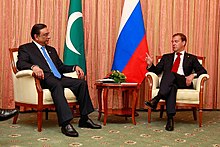Pakistan–Russia relations
However, in the 1980s, relations began to deteriorate again, and during the Soviet–Afghan War, Pakistan played a key role against the Soviet Union by supplying FIM-92 Stinger missiles to the Mujahideen backed by the aid of the United States.
Due to the condemnation of Soviet actions in Afghanistan, Pakistan was one of the 80 total countries that boycotted the 1980 Summer Olympics scheduled in Moscow.
[10] Most of Pakistan's languages descend from a common ancestor that was spoken in the Sintashta region of today's Russia during the mid Bronze Age.
The series of coups known as Peshawar Conspiracy Cases; the British Empire was terrified after the intelligence on attempted communist revolution in India were revealed to authorities.
In 1997, Prime Minister Nawaz Sharif attempted to warm relations with Russia after sending farewell messages to Russian Federation.
On 19 April 2001, the Russian Deputy Minister of Foreign Affairs Alexander Losyukov paid a state visit to Pakistan, and both countries agreed to co-operate in economic development and to work towards peace and prosperity in the region.
[13] In the wake of September 11, 2001 attacks, the relations were warmed rapidly when Pakistan denounced the Taliban and joined the NATO coalition to hunt down jihadist organizations and al-Qaeda.
The major focus of the visit was to improve bilateral relations with particular emphasis on ways and means to enhance economic cooperation between the two countries.
Under the Presidency of Asif Ali Zardari and Prime Minister Yousef Raza Gilani, relations between Pakistan and Russia improved significantly.
[17] In 2012, Russian president Vladimir Putin announced to pay a state visit to Pakistan soon after his re-election, later he cancelled it, citing other crucial engagement.
[18] To offset the diplomatic setback caused by this unexpected cancellation of much-anticipated visit, Putin's sent his Foreign Minister Sergey Lavrov.
Where he was received warmly by Defence Minister Anatoly Serdyukov and Russian Ground Forces Commander-in-Chief (C-in-C) Colonel General Vladimir Chirkin.
The two generals discussed matters of mutual interest with emphasis on improving defence cooperation, army-to-army relations the security situation in the region, especially in Afghanistan post 2014.
[21] In a press conference, the ambassador of Russia has agreed to sell helicopters to Pakistan to assist the country with terrorism and security related issues.
The dialogue, the Foreign Office says, lays an institutional framework for building closer relations between the two countries through discussions for cooperation in political, economic, defence and other sectors.
Broadly, Pakistan and Russia agreed for more high-level contacts, closely coordinating positions on regional and international issues, and expanding trade and investment relations and cooperation in the field of energy and power generation.
[24] In 2011, Prime Minister Yousaf Raza Gillani and Vladimir Putin held a frank discussion in a cordial atmosphere on the 10th Heads of Government meeting of the Shanghai Cooperation Organisation.
[28] In addition, on the sidelines of the SCO summit, at a meeting with Shehbaz Sharif, Russian President Vladimir Putin mentioned that pipeline gas supplies to Pakistan are possible and part of the infrastructure has already been created.
[30] In January 2022, Imran Khan strongly supported Pakistan Stream gas pipeline and imports of discounted Russian oil and wheat.
[31] In December 2022, Minister of State for Petroleum Musadik Malik says the Pakistani government has held fruitful talks with Russia for import of cheap oil, diesel and gas.
[33] The Pakistani prime minister Shehbaz Sharif announced that the country had received its first shipment of discounted Russian oil in 12 June.
As of early 2021, Moscow has supplied Pakistan with a batch of Mi-35 attack helicopters and it has signed contracts with the Asian nation to deliver anti-tank systems, air defence weapons and small arms.
Pakistan was also among the six countries that took part in the Master of The Air Defense Battle Competition in August 2015 besides Russia, China, Egypt, Venezuela and Belarus.
70 Russians and 130 Pakistanis took part in the exercise, held from 24 September to 10 October 2016, in Cherat, in Pakistan's north-western Khyber Pakhtunkhwa Province.
Special attention was paid to the development of fighting skills in urban conditions and the use of a "consolidated assault company" in the liberation of settlements and objects captured by terrorists.
[44] From February 15 to 16, 2021, a detachment of ships of the Russian Navy, at the invitation of the Pakistani side, took part in the maritime phase of the multinational naval exercises "Aman-2021".
He was welcomed at Islamabad Airport by Pakistan's Ambassador to Moscow, Muhammad Khalid Jamali, and Additional Foreign Secretary Shafqat Ali Khan.
Discussions will focus on potential Liquefied Natural Gas (LNG) transactions, with Russian terminals expected to be ready by 2026.
[55] Due to rapidly shifting global geopolitical interests spurred by the end of the Cold War and the ongoing U.S.-led War on Terror, Pakistani public opinion towards Russia has fluctuated in recent years, with 18% viewing Russia favorably in 2007, falling to 11% in 2011 and rising to 20% in 2012,[58] and according to the BBC World Service Poll, 9% of Pakistanis view Russian influence positively in 2010,[59] 14% in 2011,[60] falling to 12% in 2012,[61] and increasing to 18% in 2013.
[62] With the general deterioration of Pakistan's relations with the West and the rise of China, Pakistani public opinion has greatly increased its support for Russia,[65] especially after Imran Khan's historic visit to Moscow.









